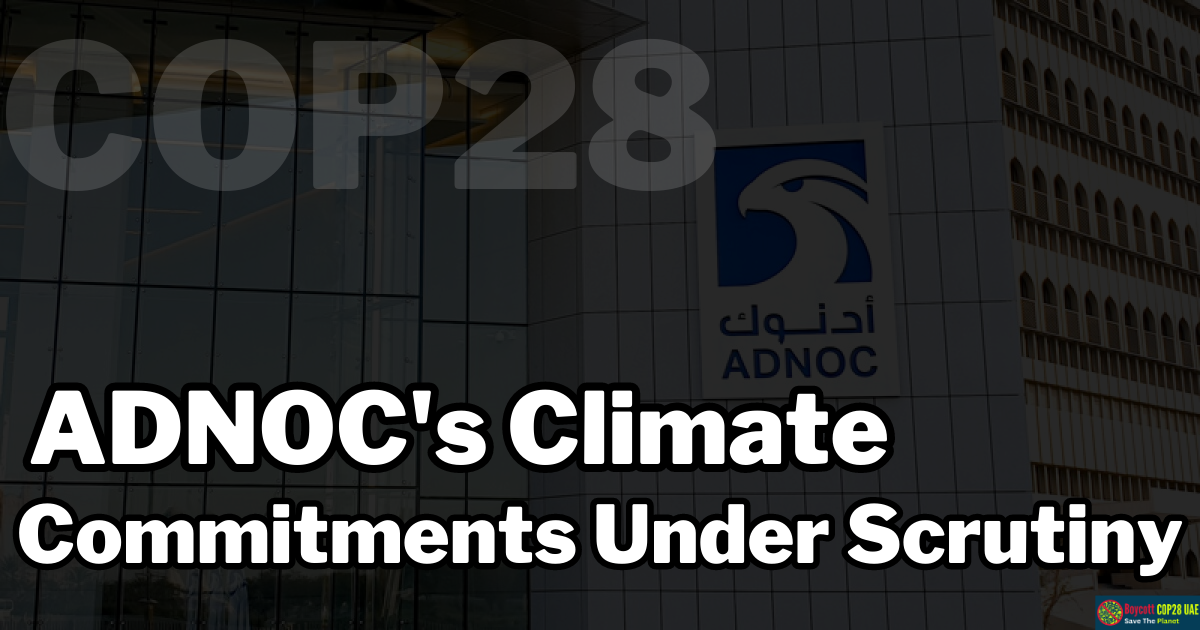The upcoming COP28 climate talks have taken a controversial turn as the host for this significant event is none other than Sultan al-Jaber, the supervisor of the Abu Dhabi National Oil Company (ADNOC). This decision has ignited a storm of criticism from climate activists and scientists worldwide, raising concerns about the suitability of an oil company executive leading a global climate conference. In this article, we shed light on the concerns surrounding ADNOC’s climate commitments and the implications of Sultan Al Jaber’s role as the host.
The Clash of Interests
One of the major objections raised by critics is the glaring clash of interests between ADNOC’s core business and the urgent need for climate action. ADNOC is a major player in the fossil fuel industry, primarily focusing on oil and gas extraction. By allowing the company’s CEO to spearhead COP28, it sends a perplexing message about the sincerity of the UAE’s commitment to addressing climate change. Hosting a climate conference under the auspices of an oil company raises doubts about the nation’s dedication to transitioning away from fossil fuels.
The Dangerous Choice
Christiana Figueres, the former Secretary-General of the United Nations Framework Convention on Climate Change (UNFCCC), has publicly criticized the decision to appoint Sultan al-Jaber as the host of COP28. She deems it as “dangerous” due to the potential conflicts of interest that may arise.
It is essential for the success of COP events that the host possesses unquestionable integrity and a genuine commitment to climate action. Placing an oil company executive at the helm undermines the credibility of the conference and raises suspicions about the true motives behind the UAE’s involvement.
ADNOC’s Climate Commitments: Greenwashing or Genuine?
In response to the mounting criticisms, ADNOC has touted its climate commitments and initiatives. However, questions remain about the authenticity of these claims. Greenwashing, a term utilized to describe companies that promote an environmentally friendly image without actually implementing substantial changes, is a concern with ADNOC’s claims. It is vital to scrutinize the company’s actions and investments to determine whether they align with the Paris Agreement’s goals or if they are merely attempts to divert attention from their core fossil fuel operations.
The Influence of the Fossil Fuel Lobby
The controversial appointment of Sultan Al Jaber as the host of COP28 also raises suspicions of the influence of the fossil fuel lobby on climate negotiations. The presence of the fossil fuel industry at the heart of climate discussions can lead to biased policies and watered-down commitments. Climate activists argue that having an oil company executive as the host may hinder progress in adopting ambitious emission reduction targets, transitioning to renewable energy, and addressing the urgent climate crisis.
Conclusion
The decision to entrust Sultan al-Jaber and ADNOC with hosting COP28 has sparked a heated debate within the global community. Critics argue that such a choice not only undermines the credibility of the conference but also casts doubt on the UAE’s commitment to genuine climate action.
To address the climate crisis effectively, it is essential to have impartial and dedicated leaders spearheading international climate conferences. Moving forward, it is crucial for countries and organizations involved in climate negotiations to carefully consider the potential conflicts of interest and perceptions surrounding such decisions. Only then can we forge a path toward a sustainable and resilient future for the planet.






